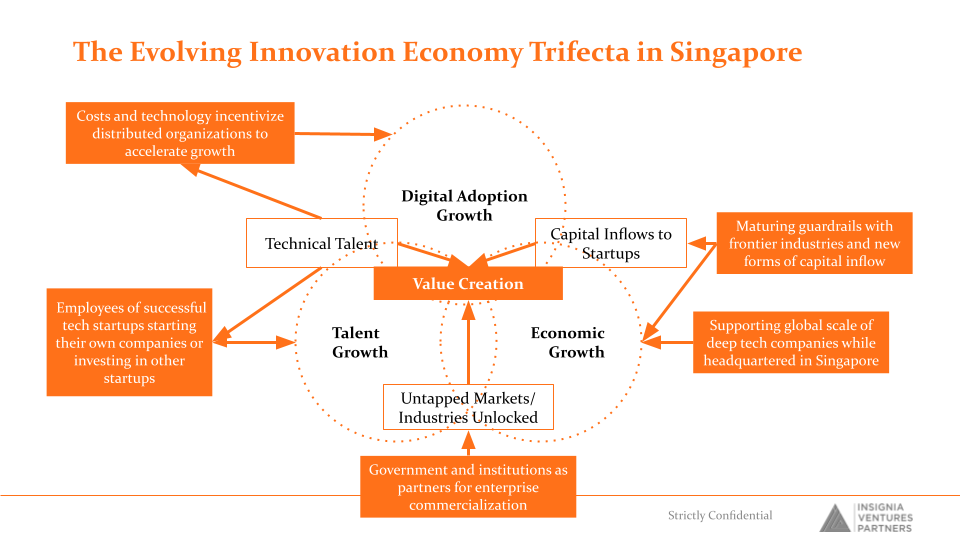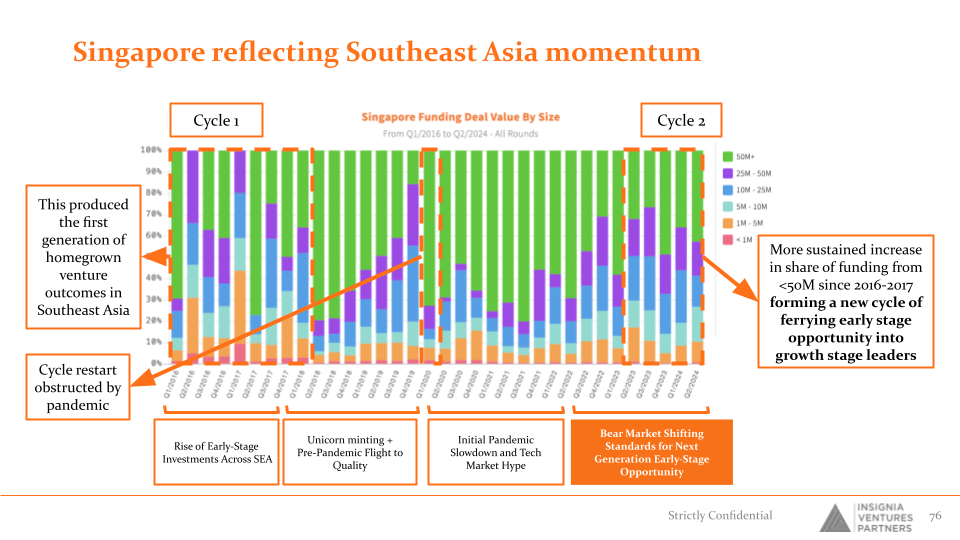Singapore’s tech ecosystem has made remarkable strides over the past decade, transforming itself into a vibrant hub for innovation, entrepreneurship, and investment. This is within today’s context of many financial institutions and organizations continuing to shift their headquarters to Singapore, leading companies in the AI and chips space like Apple, Microsoft, and NVIDIA investing more than ever into Southeast Asia markets (we’ve also written about their impact on generative AI in Southeast Asia).
Yet, as the ecosystem matures, it faces a new set of opportunities and challenges that will shape its future. With Singapore recently welcoming a new government with its fourth prime minister Lawrence Wong, we list five opportunities and challenges emerging in the country’s tech ecosystem that stem from the country’s own unique approach to enterprise and innovation.
(1) Maturing Guardrails to Thrive Amidst Talent and Capital Influx
Opportunity:
Singapore has come a long way in developing itself as a premier destination for entrepreneurs and fund managers. The city-state’s strategic location, robust infrastructure, and business-friendly environment have made it a launchpad for companies aiming to operate pan-Asia or globally. This influx of capital and talent has the potential to solidify Singapore’s status as a global tech hub.
Challenge:
The challenge for Singapore is tied to its own strength — the ability to sustain its position as a destination for entrepreneurs and fund managers to set up headquarters from which their organizations operate pan-Asia or globally. Corporate governance and regulatory compliance expectations are also maturing in the region’s tech ecosystem. The increasing influx of capital and talent will put the guardrails of Singapore to the test, as well as set up expectations for global outcomes from the country in the next few years.
Ecommerce house of brands Rainforest’s 9x revenue growth in FY2022 from the previous financial year (results posted with the company’s regulatory filings and audit) coupled with a round that brings its total funding to over 100 million, all amidst the tough environment for tech in recent years, is just one example of how startups have been continuing to build companies from Singapore serving the global market (in this case much of Rainforest’s brands sell in the US and other markets).
Rainforest CEO JJ Chai also writes a piece on runway extension.
(2) Creating Flywheels from Early-Stage Investments
Opportunity:
What is remarkable about the early initiatives for Singapore’s tech sector is that they did not only “sell” Singapore’s growth potential, but critically the Southeast Asia story. This effectively turned Singapore into a “platform” for entrepreneurs and investors across the region and highlighted the ease of doing business in the city state for businesses from countries across the region to set up domiciles and headquarters there to facilitate easier flow of capital.
Crucially, the TIS / ESVF also seeded venture funds and seed funds (like Golden Gate Ventures, Jungle Ventures), founders and executives (who became founders subsequently) which provided the building blocks for the ecosystem.
These efforts to draw in capital would eventually draw in talent as well, but for the most part it would take longer for more startups to meet the growing supply of capital. Startup investments were centered around universities and there needed to be a more significant social perception shift on becoming an entrepreneur and starting a company.
Beyond government initiatives, shifts in social perceptions towards entrepreneurship and a returnee zeitgeist have inspired many to become entrepreneurs in spite of the inherent personal challenges and professional uncertainty the endeavor brings.
Eezee is one example of a company whose founders jumped into this as their first venture, motivated by firsthand pain points in corporate life, finding each other through spaces like polytechnic incubators, and growing through partnerships with government-driven initiatives like the Singapore-Shenzhen Smart City Initiative back in 2020. (Eezee is hiring!)
Challenge:
Singapore’s tech ecosystem has entered a phase of driving outcomes — and while there have certainly been many under the radar, especially in the SaaS and B2B space, these outcomes need to not only drive returns for investors, but also drives the flywheels of entrepreneurial talent and attracting capital to future generations of startups.
Fluid is an example of the result of entrepreneurial talent flywheels where the founders came from Singapore and regional startups.
(3) Retaining Tech Talent with Increasingly Diversified Organizations
Opportunity:
Singapore has made significant progress in developing local tech talent, with computer science becoming a sought-after subject in universities. This growth in homegrown talent is critical for the ecosystem’s sustainability and innovation capacity.
Challenge:
Inasmuch as Singapore has developed initiatives to develop its own tech talent pool, companies can only compete so much to win over these talents in an increasingly competitive market.
What Singapore companies have realized is the value of hiring internationally, whether that has meant setting up operations in Malaysia or engineering hubs in India, Vietnam or China, or HR and customer services in the Philippines.
The incentives to develop these multi-country teams increased during the pandemic, but a larger incentive today for venture-backed companies is the push to regionalize or even internationalize beyond Southeast Asia.
(4) Generating Global Outcomes from the Deep Tech Focus
Opportunity:
Singapore has strategically focused on niche areas such as deep tech and biotech, laying the groundwork for these sectors to thrive. Singapore has laid the groundwork for an ecosystem around deep tech to emerge in the region, but these are largely early-stage companies and research-based.
Challenge:
A perennial challenge for deep tech startups has been to commercially scale. Specifically for Singapore, most customers for deep tech companies are in the US, Europe, Japan, and other countries that are either more used to the technology being sold or have greater willingness to pay for such solutions.
While there are companies that will remain in Singapore while selling to the rest of the world, this also draws companies that started out in the country to eventually shift HQ as they scale, or de-prioritize investments into markets in the region.
There’s greater incentive for Singapore to foster adoption of deep tech solutions across East Asia, allowing companies to scale globally while also keeping investing in the region as they do so. For example, igloocompany in smart access found growth in the US and Europe through their enterprise business while continuing to build their consumer business especially in Singapore and surrounding markets.
(5) Evolving Government Roles in a Mature Ecosystem
Opportunity:
As Singapore’s startup ecosystem matures, the government’s role evolves from attracting talent and capital to facilitating global scaling and ensuring corporate governance. The government can continue to play a crucial role in setting up international partnerships, co-investment opportunities, and increasing the attractiveness of local stock exchanges.
Challenge:
While there are more variables in this stage outside of the government’s control, the government’s role as a safeguard for facilitation and development of these companies to ensure corporate governance and compliance is more important at this stage than ever before.
Government also has a role to play in setting up bridges across countries to co-invest in regional companies or set up exchange connectivity to increase the attractiveness of local bourses (which we’ve written about previously).
This maturity also does not mean deprioritizing the early-stage, incubation, and talent development initiatives — this role also is important in building a flywheel of support infrastructure from idea to the public markets.
Working with startups like Intellect in implementing programs (e.g., multi-year partnerships with mindline.sg to support with resources and content, MFHA™ training, roll out of its services to 150,000 government employees through their tender with Singapore’s Whole of Government, covering specifically their Public Service Division) aligned with national priorities like mental health can go a long way in driving innovation across different sectors, especially in areas like mental health that have previously been under the radar or overlooked.
The Value of Pro-Enterprise, Regulatory Innovation

The backdrop for the new government is one where Southeast Asia, and Singapore especially, is becoming an important bridge for innovation capital and talent to converge from both sides of the Pacific. It will be important to balance the quantity and quality of this influx of talent and capital as it continues to grow.
Singapore is also very pro-enterprise and is one of the few (perhaps only) countries to have a Pro-Enterprise Panel headed by the head of civil service and comprising of private sector members (our founding managing partner Yinglan Tan a current member). The panel has delivered many pro-enterprise and pro-startup measures over the years (see our podcast with the director of PEP Liu Chen).
Finally, Singapore has also historically set the tone for tech regulation for the rest of the region, and with growing adoption around AI for example (e.g., more global AI companies setting up data centres and servers in the region), the ability to develop guardrails that protect while also fostering innovation will be important.
Paulo Joquiño is a writer and content producer for tech companies, and co-author of the book Navigating ASEANnovation. He is currently Editor of Insignia Business Review, the official publication of Insignia Ventures Partners, and senior content strategist for the venture capital firm, where he started right after graduation. As a university student, he took up multiple work opportunities in content and marketing for startups in Asia. These included interning as an associate at G3 Partners, a Seoul-based marketing agency for tech startups, running tech community engagements at coworking space and business community, ASPACE Philippines, and interning at workspace marketplace FlySpaces. He graduated with a BS Management Engineering at Ateneo de Manila University in 2019.
